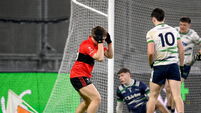Jack Anderson: Motion 19 was not helped by ‘internal inconsistencies’

A general view of a voting 'zapper' during the GAA Special Congress at Croke Park in Dublin. Picture: Piaras Ó Mídheach/Sportsfile
Michael O'Hehir's commentaries evoke sepia summers of past provincial and All-Ireland finals.











